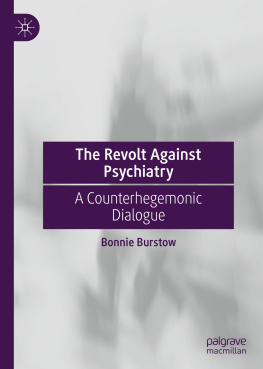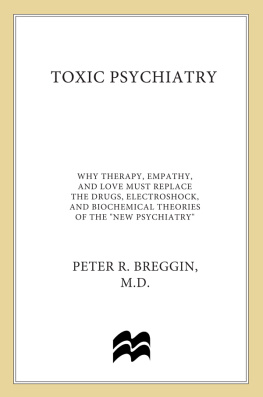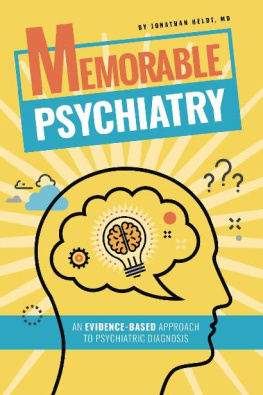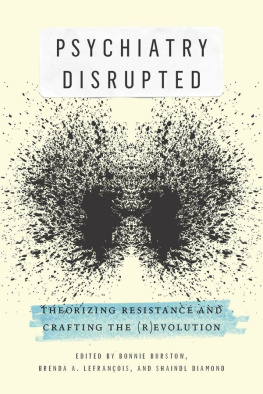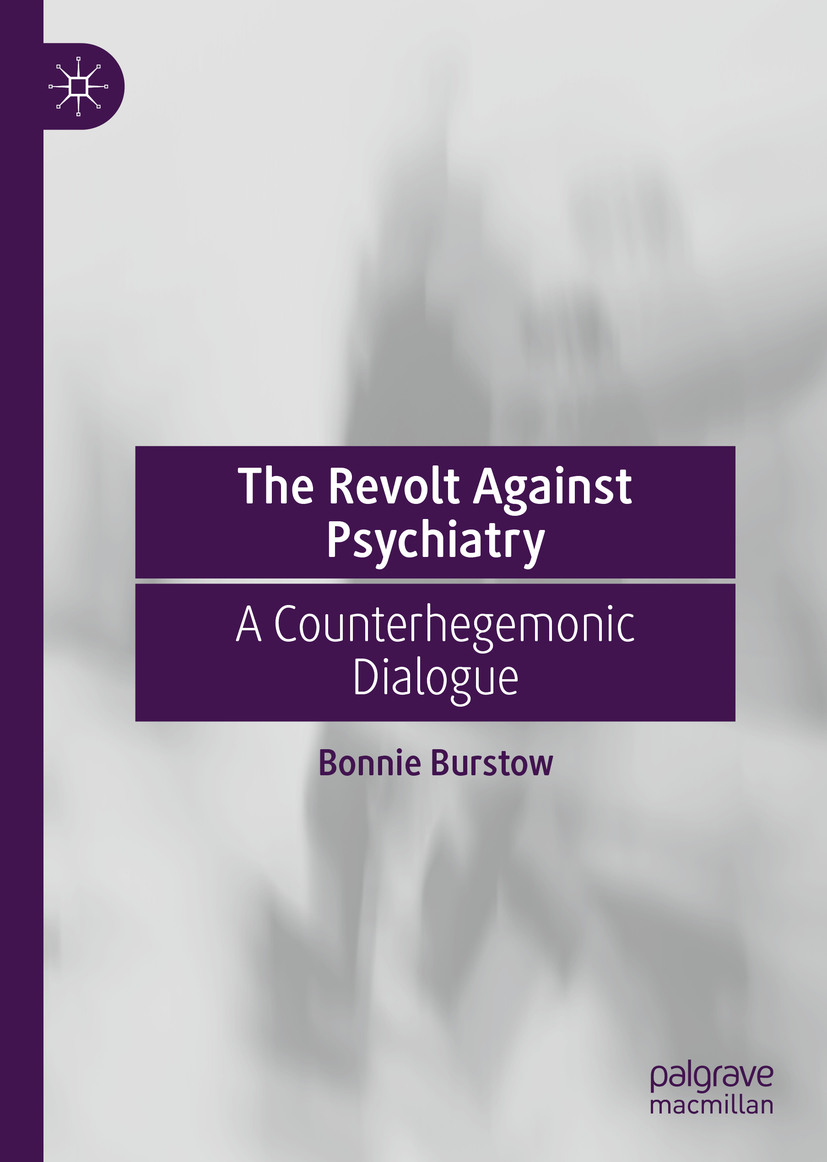Bonnie Burstow
The Revolt Against Psychiatry
A Counterhegemonic Dialogue
Bonnie Burstow
Ontario Institute for Studies in Education, Adult Education and Community Development, Toronto, ON, Canada
ISBN 978-3-030-23330-3 e-ISBN 978-3-030-23331-0
https://doi.org/10.1007/978-3-030-23331-0
The Editor(s) (if applicable) and The Author(s), under exclusive license to Springer Nature Switzerland AG 2019
This work is subject to copyright. All rights are solely and exclusively licensed by the Publisher, whether the whole or part of the material is concerned, specifically the rights of translation, reprinting, reuse of illustrations, recitation, broadcasting, reproduction on microfilms or in any other physical way, and transmission or information storage and retrieval, electronic adaptation, computer software, or by similar or dissimilar methodology now known or hereafter developed.
The use of general descriptive names, registered names, trademarks, service marks, etc. in this publication does not imply, even in the absence of a specific statement, that such names are exempt from the relevant protective laws and regulations and therefore free for general use.
The publisher, the authors and the editors are safe to assume that the advice and information in this book are believed to be true and accurate at the date of publication. Neither the publisher nor the authors or the editors give a warranty, express or implied, with respect to the material contained herein or for any errors or omissions that may have been made. The publisher remains neutral with regard to jurisdictional claims in published maps and institutional affiliations.
This Palgrave Macmillan imprint is published by the registered company Springer Nature Switzerland AG
The registered company address is: Gewerbestrasse 11, 6330 Cham, Switzerland
A truly outstanding contribution to critical work in this area. I simply loved reading the manuscript; by turns, questioning, thought-provoking, heart-breaking, challenging, yet always positive, sensitive to different outlooks, and with a real humanistic quality at its heart. I congratulate Professor Burstow and all the contributors to the book the text is really moving, and made me (as a mental health academic ) reflect upon a whole number of issues. So inspiring!
Bruce Cohen, Senior Lecturer in Sociology, University of Auckland, New Zealand
Revolt against Psychiatry is a celebration of living life on ones own terms. Defiant, relentless and radical, these anti/ critical psychiatry dialogues extol activism and commitment from the edges of a world intent on not listening. A must-read for those thinking about the impact of institutional violence and what it means to be an expert through experience. A stellar contribution. Migwetch, everyone involved, and Mazel Tov.
Jennifer Wemigwans, Assistant Professor, OISE/University of Toronto, Canada, and author of A Digital Bundle: Protecting Indigenous Knowledge Online
A terrific read, this latest book of Professor Bonnie Burstows is an exceptional contribution to her already formidable repertoire. Consisting of 15 dialogical interviews with major players in the critical and antipsychiatry fields in different parts of the world, it is highly accessible, is enormously informative, and I predict will quickly become an indispensable go-to resource both for seasoned scholars and new students trying to wrap their mind around the revolt against psychiatry. Venceremos , Bonnie
Stephen Ticktin, member of the Medical Psychotherapy Association of Canada
In this amazing book, Bonnie Burstow gathers together a wide variety of expert global players in the critical/ antipsychiatry movement. These stand-alone thought-provoking dialogues stimulate debate and offer a fascinating look into the opinions and strategies of people who challenge psychiatry. Passionate, gripping, heart-warming, and at times harrowing.
Cheryl Prax, survivor and member of the British activist group Speak Out Against Psychiatry, UK
Fantastic Work! Burstows wide-ranging and deeply engaging series of dialogues not only exposes psychiatry as a pseudoscience but provides clues on how to resist and replace it. With a solid focus on human rights and an unwavering commitment to follow where the science leads, Burstow demonstrates that psychiatry isnt a service. Its a disservice.
Irit Shrimrat, co-founder of the Ontario Psychiatric Survivors Alliance, Canada
This book is dedicated to Vern Harper a psychiatric survivor and an Indigenous man, who, in his early years, was involuntarily psychiatrically incarcerated and, in the process, subjected to an insidious combination of racism and sanism . Now during his psychiatric incarceration Vern came perilously close to being electroshocked on two separate occasionsand who can say how his story would have unfolded had they actually gone through with the highly brain-damaging procedure? What happened? As the fates would have it, both times, when the moment when he was to be shocked arrived, the psychiatrist assigned hima chap from Indiaunceremoniously entered the ECT room where Vern was lying and yanked the plug to the ECT machine out of the wall, exclaiming, Not to my people, you dont! (and no, the psychiatrist in question was not Indigenous ). Now eventually Vern got himself out of the system and went on to live a singularly productive and worthwhile life in which he contributed substantially to society. A helper and a leader of people, whose brainthank God!had never been fried, he went on to work at a huge number of social service agencies in Toronto. He became a highly respected and renowned elder, was known everywhere as the urban elderthe Toronto elder who could always be counted on to stand up for social justice. He co-organized the now legendary across-Canada trek to raise awareness of broken treaties (the Native Peoples Caravan). At the same time, he remained an outspoken member of the mad movement.
Late in his life, to the surprise of many of us, he started working at Centre for Addiction and Mental Health (CAMH), which is as mainstream psychiatry as you can get and where he served as in-house elder. Now while he had previously been involved in an early antipsychiatry publishing venture of mine Shrink Resistant: The Struggle Against Psychiatry in Canada at this point, I lost touch with him, saddened by what appeared to be the movements loss of him.
Fast forward ten yearsone day I heard that there had been a falling-out between Vern and CAMH and I immediately had a message relayed to him, inviting him to phone me, which indeed he did. About 15 minutes into the phone call, I inquired about the falling-out and asked Vern what he had learned from his ten years stretch working at CAMH. Without a moments hesitation, he responded, You know, Bonnie, if there is one thing that my ten years here has taught me, it is that what they do here, it is not good for my people. We schmoozed for a while, and it was during this conversation I told him about this new dialogical book on which I was working. After telling me that he was eager to contribute once again to the movement in any way he could, he expressed a particularly keen interest in being interviewed for this very book, adding that in the interview, he would like to tell the story of almost being electroshocked for he felt that the story had the potential of doing good. All good. We never did get around to conducting the interview, however, for Vern was old and ill at this point; already he was beginning to fade; and before we were able to proceed further, he died.

